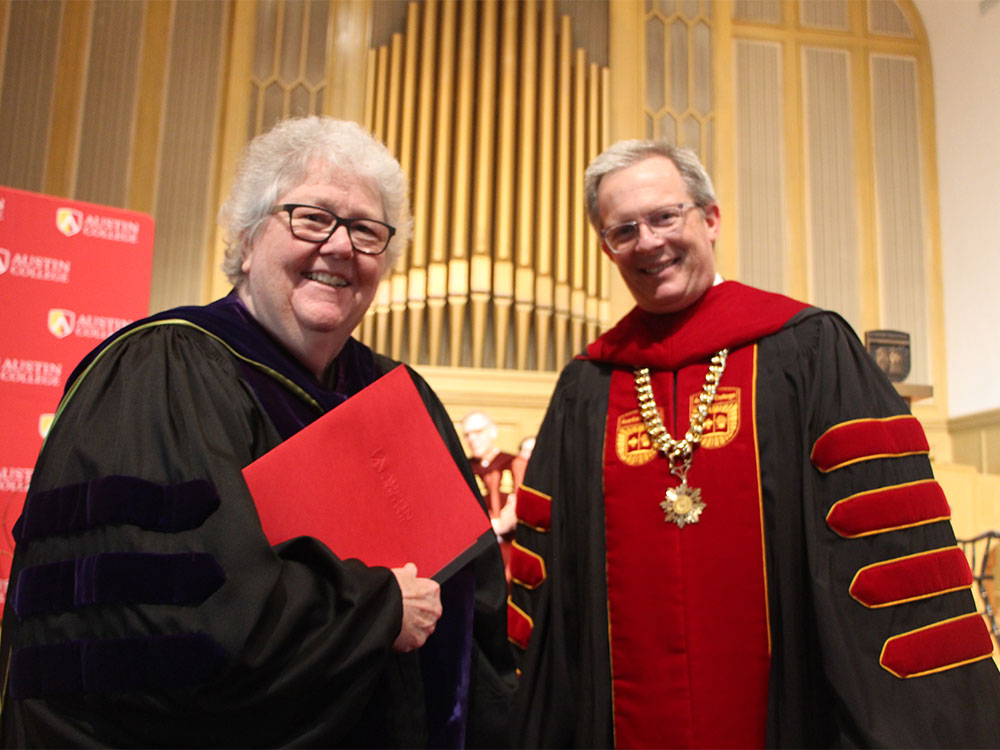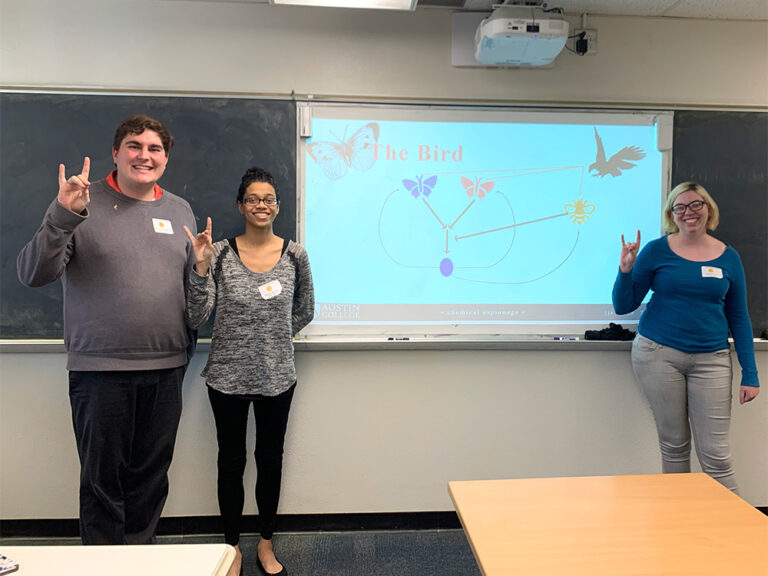 For more than 40 years, Dr. Victoria Hennessey Cummins shared her lifelong love of history, specifically Latin American history, with Austin College students. She embraced the liberal arts community, and small classes allowed meaningful interaction with students and colleagues. “I had the luxury of having picked a job that lets me concentrate on the thing I like best—history,” she said in a campus interview a few years ago.
For more than 40 years, Dr. Victoria Hennessey Cummins shared her lifelong love of history, specifically Latin American history, with Austin College students. She embraced the liberal arts community, and small classes allowed meaningful interaction with students and colleagues. “I had the luxury of having picked a job that lets me concentrate on the thing I like best—history,” she said in a campus interview a few years ago.
The Austin College community also recognizes that she shared that love of history with her husband, Professor Emeritus of History Dr. Light Cummins, a U.S. and Texas history expert who retired from Austin College teaching in 2018. He and Vicki made their way to Sherman Hall together most every day through the majority of their careers.
Vicki has received many accolades for her own scholarship, which is plentiful. She has written and presented extensively about her expertise in colonial Mexico and Latin America and in specialty areas and interests that have developed over the years. She is active in several Texas and Louisiana professional history organizations and earned the East Texas Historical Association’s C.K. Chamberlain Award in 2016 for the best article published in the previous year.
This spring, she received the Humanities Division Award for Outstanding Scholarship, an honor she also received from her colleagues in 2011 and in 2016. She has held the A.M. Pate Jr. Chair in History for several years.
Last spring, she earned the College’s Excellence in Teaching Award, and it is in her teaching that she finds her greatest satisfaction. “I continued to teach past retirement age because I enjoyed it so much,” Cummins said. “I loved the fun of classroom give-and-take with students and the emotional immediacy of face-to-face teaching. I would like to think that I have been able to inspire in my students some of the intense enthusiasm I have for history.”
She said that her teaching experiences have always been the envy of her colleagues at large universities. “My interdisciplinary contacts and teaching opportunities are something they seldom experience,” Cummins said. “One of the most enjoyable things I have ever done in teaching was to teach connected courses on the Mexican Revolution with Dr. Patrick Duffey of the Spanish Department. Our classes shared readings and films, and the different disciplinary insights Patrick brought enhanced both my students’ and my understanding of the material.”
One thing that kept her teaching fresh is her creation of new topical courses. In the last three years, she introduced two new history classes. One of those, “Natural Disasters in the U.S.,” certainly has proven timely. “The last unit was on ‘Epidemics and Pandemics in American History,’ and the final lecture was on pandemic threats of the future,” Cummins said. “I hope that class has helped some of my former students to contextualize what is currently going on.”
What is currently going on in a COVID-19 society is nothing anyone expected and certainly not how Cummins saw her career ending. “I spent 43 years teaching face-to-face, and I have missed it since spring break. I don’t think online teaching will ever replace the classroom experience.”
Cummins said she did have a wonderful class during spring remote learning, and that was some compensation for not seeing her students regularly. “I also learned to use ZOOM fairly competently,” she said. “I just wish I could have completed my teaching journey in closer day-to-day contact with my students.”
Though her classroom days are behind her now, she has much on her schedule. She is preparing her second article for a book of essays that she is co-editing about women in early Texas art. That project is expected to occupy her well into 2021. “I consider this a labor of love, rather than work,” she explained. “My (adult) kids think that it is kind of nerdy, but nothing pleases me more than an intense, successful day of research.”
Once this book project is complete, she has additional cultural history topics she would like to pursue. In the meantime, she is living in Denton and enjoying time with her family, especially her young grandson. Some leisure reading is also on her agenda; she may well discover new exploration and research potential in the pages.
Austin College, a private national liberal arts college located north of Dallas in Sherman, Texas, has earned a reputation for excellence in academic preparation, international study, pre-professional foundations, leadership development, committed faculty, and hands-on, adventurous learning opportunities. One of 40 schools profiled in Loren Pope’s influential book Colleges That Change Lives, Austin College boasts a welcoming community that embraces diversity and individuality, with more than 50 percent of students identifying as persons of color. The residential student body of approximately 1,300 students and more than 100 expert faculty members allow a 13:1 student-faculty ratio and personalized attention. Related by covenant to the Presbyterian Church (USA), Austin College cultivates an inclusive atmosphere that supports students’ faith journeys regardless of religious tradition. The College, founded in 1849, is the oldest institution of higher education in Texas operating under original name and charter.



